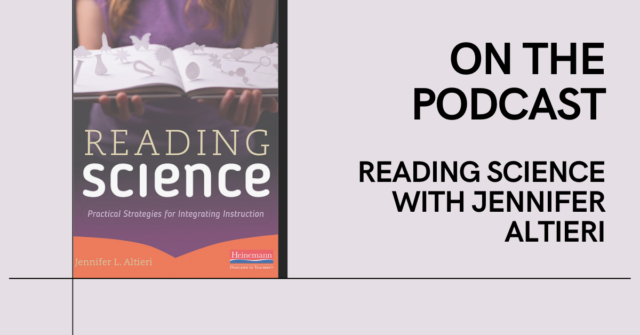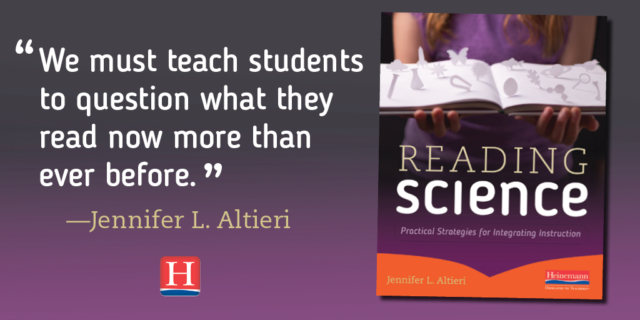
Jennifer Altieri's newest book Reading Science reminds us that literacy skills aren't add-ons to the science class—they're critical parts of instruction. Since science requires specialized literacy demands, students should be prepared not only for today's science class but for the science class of the future and the world at large. In this post adapted from the beginning of the book, Jennifer explains the need for science teachers to teach literacy if we want our students to be able to understand scientific material.
Rethinking the Science-Literacy Relationship
by Jennifer Altieri
In order to gain scientific knowledge, our students must be able to understand scientific material. This requires our students to possess the literacy skills necessary to read, view, and articulate scientific thoughts. Most of us are familiar with the phrase content area literacy. Many of us took a content literacy course in order to become a teacher. Often the content in a class such as this focuses on specific strategies that can help students understand content area material. Whether planning to teach math, science, or social studies, everyone sits together to learn how to use SQ3R (Robinson 1946), KWL (Ogle 1986), and other popular content area strategies with future students. Then future teachers walk out of the classroom with notebook pages or word documents full of strategies to use in lessons.
If you are like me, and took a class similar to this, the confidence didn’t last long. In fact, by the time I could locate the well-worn notebooks during my first year of teaching or find the file folders containing the notes or locate electronic files that were lost in computer crashes or moves, it was apparent that the information from that class was not helping my teaching of science as much as I was hoping. We get frustrated because we work long hours each day to help our students access scientific material, and yet many of our students continue to struggle with the scientific texts we want them to read.
We Must Focus on Scientific Literacy Skills
Instead of looking at everything with a broad lens, we need to look more closely at the materials, demands, and requirements for our own content area. Research by Shanahan and Shanahan (2008) emphasizes that each content area has unique literacy demands, known as disciplinary literacy skills, and it is through the development of these important skills that our students learn to read, write, and think like historians, scientists, and mathematicians. In particular, Shanahan and Shanahan list these literacy skills specific to scientists:
- Scientists must be able to read and comprehend a wide variety of texts, and often they must also be able to examine and compare information from multiple sources on the same topic.
- Scientists must not only possess a large scientific vocabulary but also know how to determine the meaning of new words they encounter in scientific text.
- Scientists must be able to not only understand images but also shift their attention from printed text to images and back to printed text in order to comprehend text.
Of course even if our students do not choose to pursue scientific fields, they still need to develop these disciplinary literacy skills in science so that they will be able to make educated decisions and be contributing members of society. As adults, we often have to make decisions regarding the type of medical treatment we or a loved one might need. We also need to be advocates for practices that can positively influence our neighborhoods and families. We debate whether fluoride should be added to water or whether a factory might be impacting cancer rates in our communities. The only way we can read about, research, and intelligently respond to these issues is through the development of these disciplinary literacy skills. These skills are important to all of our students.
Why Is This Our Job? Why Are We Perfect for the Job?
As teachers of science, we are ideal for teaching the literacy skills our students need to understand science. We aren’t teaching students to read for the sake of learning to read but rather helping them to develop the specific types of literacy skills they need to not only learn scientific information but also be able to ultimately think and read about science topics independently. It seems more appropriate to look at ourselves as disciplinary literacy experts. We must know the specific literacy skills necessary for students to comprehend scientific information and articulate their understanding. For us, that means we need to continually think about the skills necessary to create scientists in our classroom and know how we can best develop those skills.
As science teachers, our goal is to develop students who can understand and evaluate sources of scientific information. Not only must students be able to comprehend what the author is stating in the scientific text, but they must also be able to realize that all text is not created equal, and not all information they read is accurate. They must be aware of the importance of examining multiple sources of information on a scientific topic and understand that an author may have had a reason for presenting information in the way that it is shared. Our students must use their knowledge of images and vocabulary in order to gain meaning from the text.
We also want our students to develop the skills and strategies necessary to ultimately be able to increase and deepen their scientific knowledge independently. This requires putting the appropriate scaffolds in place to enable our students to develop these literacy skills. Therefore, this teaching must occur while students are learning scientific information. The integration of literacy and science is a necessary part of our classrooms.
Reading Science: Practical Strategies for Integrating Instruction is out now
♦ ♦ ♦ ♦
 Jennifer Altieri has been a teacher, reading consultant, and is currently associate professor of literacy at Coastal Carolina University. The author of multiple books and a frequent presenter at conferences, Jennifer is passionate about developing readers, writers, and thinkers through content literacy. Her newest book is Reading Science: Practical Strategies for Integrating Instruction.
Jennifer Altieri has been a teacher, reading consultant, and is currently associate professor of literacy at Coastal Carolina University. The author of multiple books and a frequent presenter at conferences, Jennifer is passionate about developing readers, writers, and thinkers through content literacy. Her newest book is Reading Science: Practical Strategies for Integrating Instruction.


